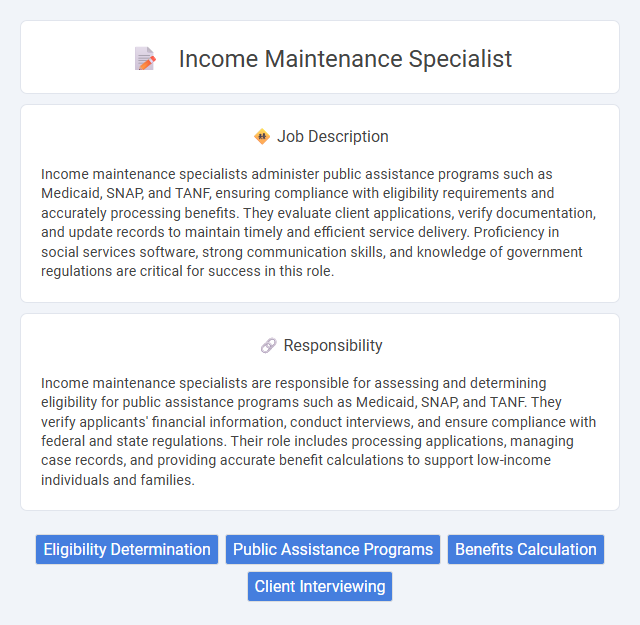
Income maintenance specialists administer public assistance programs such as Medicaid, SNAP, and TANF, ensuring compliance with eligibility requirements and accurately processing benefits. They evaluate client applications, verify documentation, and update records to maintain timely and efficient service delivery. Proficiency in social services software, strong communication skills, and knowledge of government regulations are critical for success in this role.
Income maintenance specialist roles likely fit individuals who demonstrate strong organizational skills and empathy, as they often assist clients facing financial hardship or navigating complex assistance programs. Those comfortable with data management and regulatory frameworks might find this job more suitable, given its focus on processing applications and ensuring eligibility accuracy. Candidates with resilience and patience probably perform better, since the role involves frequent client interaction and resolving sensitive issues under stress.
Qualification
Income maintenance specialists require a high school diploma or equivalent, with many employers favoring candidates who hold an associate's or bachelor's degree in social work, public administration, or a related field. Proficiency in computer systems, case management software, and knowledge of eligibility criteria for government programs such as Medicaid, SNAP, and TANF are essential qualifications. Strong analytical skills, attention to detail, and the ability to communicate effectively with clients are critical for successfully evaluating and managing benefits.
Responsibility
Income maintenance specialists are responsible for assessing and determining eligibility for public assistance programs such as Medicaid, SNAP, and TANF. They verify applicants' financial information, conduct interviews, and ensure compliance with federal and state regulations. Their role includes processing applications, managing case records, and providing accurate benefit calculations to support low-income individuals and families.
Benefit
Income maintenance specialists likely play a crucial role in ensuring that individuals and families receive appropriate government assistance programs, which may improve financial stability and reduce poverty risks. They probably help clients navigate complex eligibility requirements, increasing the chances of accessing benefits that support basic living needs. Their work often contributes to better community well-being by maintaining consistent income support services.
Challenge
Income maintenance specialists likely face the challenge of navigating complex eligibility requirements and regulatory changes that impact client benefits. They probably need to balance accuracy with efficiency in processing applications to prevent errors that could affect vulnerable populations. Managing high caseloads and addressing client concerns may also present significant difficulties in maintaining service quality.
Career Advancement
Income maintenance specialists manage public assistance programs, ensuring eligible individuals receive financial aid such as Medicaid, food stamps, and TANF. Career advancement opportunities include roles like caseworker supervisor, program analyst, and social services manager, often requiring additional certifications or a degree in social work or public administration. Developing expertise in regulatory compliance and data management enhances prospects for leadership positions within government agencies.
Key Terms
Eligibility Determination
Income maintenance specialists play a crucial role in determining eligibility for public assistance programs such as Medicaid, SNAP, and TANF. They assess applicants' financial information, verify documentation, and apply program guidelines to ensure accurate benefit allocation. Expertise in state and federal regulations, attention to detail, and strong analytical skills are essential for effective eligibility determination in this role.
Public Assistance Programs
Income maintenance specialists play a critical role in administering public assistance programs such as Temporary Assistance for Needy Families (TANF), Supplemental Nutrition Assistance Program (SNAP), and Medicaid. They assess eligibility, process applications, and ensure compliance with program guidelines while providing clients with information on benefits and resources. Expertise in federal and state regulations is essential to effectively manage caseloads and support vulnerable populations.
Benefits Calculation
Income maintenance specialists perform accurate benefits calculation by assessing eligibility and determining appropriate financial assistance amounts for clients. They analyze income, household size, and resource data to ensure compliance with government assistance program regulations such as Medicaid, SNAP, and TANF. Proficiency in benefits calculation software and understanding policy changes are critical for maximizing support and minimizing errors.
Client Interviewing
Income maintenance specialists conduct thorough client interviewing to accurately assess eligibility for public assistance programs such as SNAP, Medicaid, and TANF. They utilize structured questioning techniques to gather essential financial, employment, and household information while ensuring compliance with regulatory guidelines. Effective client interviewing enhances the accuracy of benefit determinations and supports clients in accessing necessary social services efficiently.
 kuljobs.com
kuljobs.com